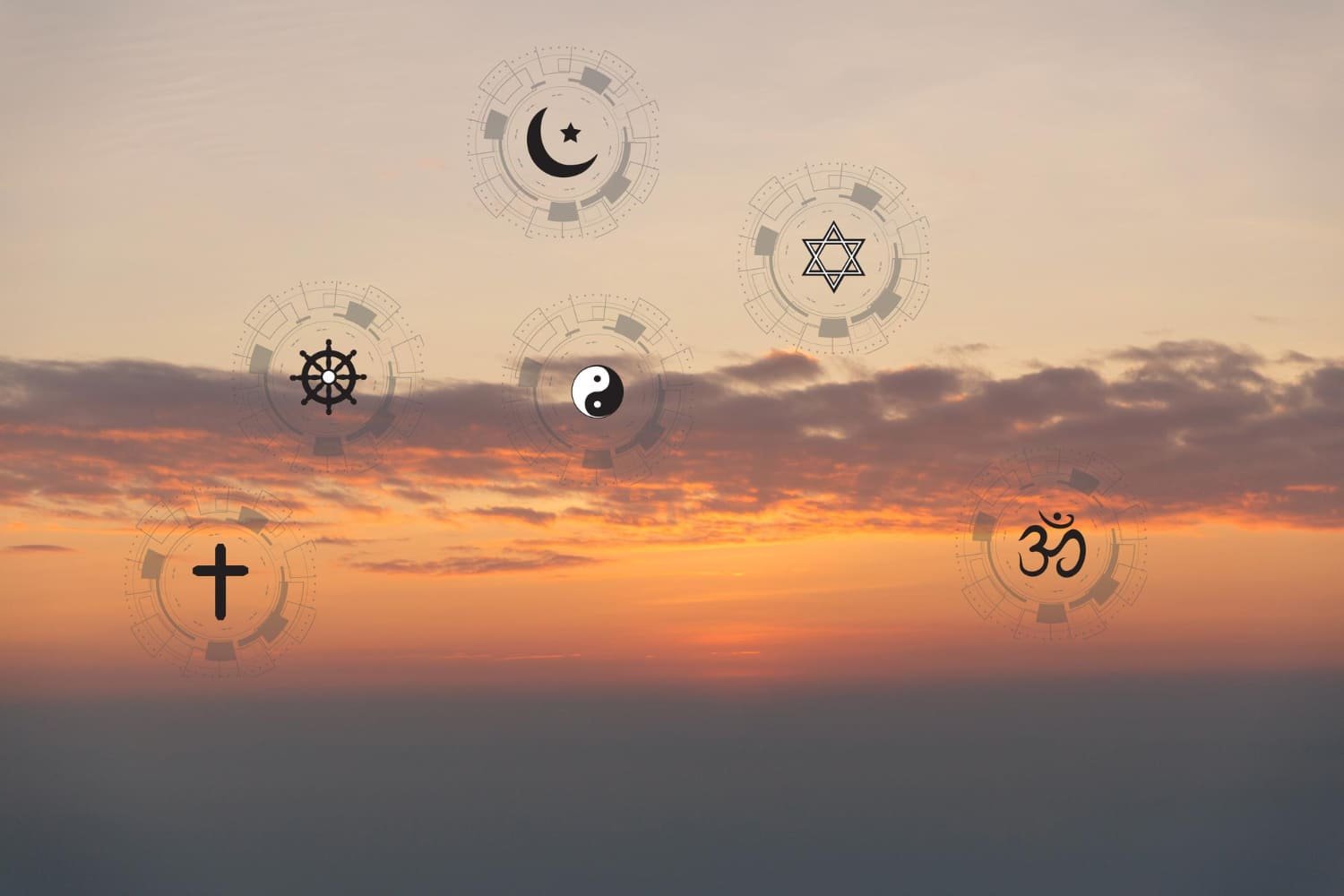Comparing and contrasting different religions is a topic that has been debated for centuries. Two of the most popular religions in the world are Judaism and Buddhism. While both religions have their own unique beliefs and practices, they also share some similarities.
This article will explore the differences between Judaism and Buddhism, and examine which one is better based on different criteria.
Judaism is a monotheistic religion that originated in the Middle East over 3,000 years ago. It is based on the belief in one God who revealed himself to Abraham, Moses, and the other prophets of the Hebrew Bible.
Judaism is characterized by a strict adherence to religious laws and traditions, including the observance of the Sabbath, the celebration of various holidays, and the performance of daily prayers.
Buddhism, on the other hand, is a non-theistic religion that originated in India over 2,500 years ago. It is based on the teachings of Siddhartha Gautama, also known as the Buddha, who taught that the ultimate goal of life is to achieve enlightenment and end suffering.
Buddhism is characterized by the Four Noble Truths, the Eightfold Path, and the practice of meditation.
Origins and History of Judaism and Buddhism
Judaism is one of the oldest monotheistic religions, dating back nearly 4,000 years. It originated in the Middle East, in the land of Canaan, which is now Israel and Palestine. The religion was founded by Abraham, who is considered the father of the Jewish people.
According to Jewish tradition, God revealed himself to Abraham and made a covenant with him, promising to make his descendants into a great nation. Moses, another important figure in Judaism, received the Ten Commandments from God and led the Israelites out of slavery in Egypt.
Buddhism, on the other hand, originated in India around the 5th century BCE. It was founded by Siddhartha Gautama, who is known as the Buddha, which means “enlightened one.” The Buddha taught that the way to end suffering is to eliminate desire and attachment. He also taught the Four Noble Truths, which are the foundation of Buddhist philosophy.
Over time, both religions developed complex theological and philosophical systems. Judaism has a rich tradition of rabbinic commentary and interpretation of the Torah, the Jewish holy book. It also has a long history of persecution, including the Holocaust during World War II.
Buddhism has many different schools and traditions, including Theravada, Mahayana, and Vajrayana. It has spread to many different parts of the world, including Southeast Asia, China, Japan, and Tibet.
Beliefs and Teachings of Judaism and Buddhism
Judaism and Buddhism are two distinct religions with different beliefs and teachings. While Judaism is a monotheistic religion with a belief in one God, Buddhism is a non-theistic religion that does not believe in a personal God.
Here are some key beliefs and teachings of both religions: Judaism:
- Judaism believes in the existence of one God who is the creator of the universe and all living things.
- God gave the Torah to Moses on Mount Sinai, which contains the laws and commandments that Jews are supposed to follow.
- Judaism teaches that humans were created in the image of God and have free will to choose between good and evil.
- Jews believe in the concept of the afterlife, where the soul goes to either heaven or hell depending on how they lived their life.
Buddhism:
- Buddhism does not believe in a personal God or creator of the universe.
- The Buddha, or the enlightened one, taught the Four Noble Truths, which state that life is suffering, the cause of suffering is desire, suffering can be overcome, and the path to overcoming suffering is through the Eightfold Path.
- Buddhism teaches the concept of impermanence, that everything in life is constantly changing and nothing is permanent.
- Buddhism believes in the concept of reincarnation, where the soul is reborn into a new body after death based on their karma or actions in their previous life.
Overall, while Judaism and Buddhism have some similarities in their teachings about morality and ethics, they have fundamental differences in their beliefs about the existence of God and the afterlife.
Practices and Rituals in Judaism and Buddhism
Judaism and Buddhism are two religions with different origins, beliefs, and practices. While Judaism is a monotheistic religion that originated in the Middle East, Buddhism is a non-theistic religion that originated in India. Both religions have unique practices and rituals that are central to their faith.
In Judaism, prayer is a central practice. Jews pray three times a day, facing Jerusalem, and recite blessings before and after meals.
Another important practice in Judaism is circumcision, which is performed on male infants when they are eight days old. Bar and Bat Mitzvahs are also important rituals in Judaism, marking the coming of age of boys and girls respectively.
On the other hand, Buddhism does not have a set prayer schedule. Instead, Buddhists focus on meditation as a way of connecting with the divine. There are different types of meditation in Buddhism, including mindfulness meditation, loving-kindness meditation, and insight meditation.
Buddhists also have various festivals and ceremonies throughout the year, such as Vesak, which celebrates the birth, enlightenment, and death of the Buddha.
Another important practice in Buddhism is the use of mantras and mudras. Mantras are sacred words or phrases that are repeated during meditation, while mudras are hand gestures that are used to focus the mind and channel energy. In addition, Buddhists also make offerings of incense, flowers, and food to the Buddha and other deities.
Overall, while both Judaism and Buddhism have unique practices and rituals, they differ significantly in their approach to prayer and meditation. Judaism places a greater emphasis on prayer, while Buddhism focuses on meditation as a way of connecting with the divine.
Comparison of Judaism and Buddhism
Judaism and Buddhism are two distinct religions with different beliefs and practices. This section will compare and contrast the two religions in terms of their beliefs, practices, and values.
Beliefs
Judaism is a monotheistic religion that believes in one God who is the creator of the universe. They believe that God revealed himself to Moses and gave him the Ten Commandments, which form the basis of Jewish law. They also believe in the coming of a Messiah who will redeem the world.
Buddhism, on the other hand, is a non-theistic religion that does not believe in a creator God. Instead, they believe in the Four Noble Truths and the Eightfold Path, which are teachings on how to achieve enlightenment and end suffering.
They also believe in the concept of reincarnation and karma, where a person’s actions in this life will affect their future lives.
Practices
Judaism has many practices and rituals, including prayer, Torah study, and observing the Sabbath. They also have dietary laws, such as not eating pork or shellfish, and celebrate holidays such as Passover and Hanukkah.
Buddhism has many practices as well, including meditation, mindfulness, and chanting. They also have ethical guidelines, such as the Five Precepts, which are similar to the Ten Commandments in Judaism. They celebrate holidays such as Vesak, which commemorates the birth, enlightenment, and death of the Buddha.
Values
Judaism values community, family, and social justice. They believe in helping the less fortunate and performing acts of kindness, or mitzvot. They also place a strong emphasis on education and the pursuit of knowledge.
Buddhism values compassion, wisdom, and mindfulness. They believe in treating all living beings with kindness and respect and avoiding harm to others. They also believe in the importance of self-reflection and personal growth.
Overall, Judaism and Buddhism are two unique religions with different beliefs, practices, and values. While they share some similarities, such as ethical guidelines and the pursuit of a better life, they differ in their concepts of God, the afterlife, and the path to enlightenment.
Which One Is Better?
Deciding which religion is better, Judaism or Buddhism, is a subjective matter and depends on individual beliefs and values. Both religions have their unique philosophies, practices, and principles that appeal to different people.
For those who value community and tradition, Judaism may be the better choice. Judaism emphasizes the importance of community and family, and its rituals and practices are steeped in tradition. Judaism also offers a clear set of guidelines and laws to follow, providing structure and stability in life.
On the other hand, for those who seek inner peace and enlightenment, Buddhism may be the better choice. Buddhism teaches the importance of mindfulness, meditation, and self-awareness, leading to a greater understanding of oneself and the world around us.
Buddhism also promotes compassion and non-violence, making it an appealing choice for those who value peace and harmony.
Ultimately, the decision of which religion is better is a personal one and should be based on individual beliefs and values. Both Judaism and Buddhism offer valuable insights and teachings that can enrich one’s life and lead to personal growth and fulfillment.







